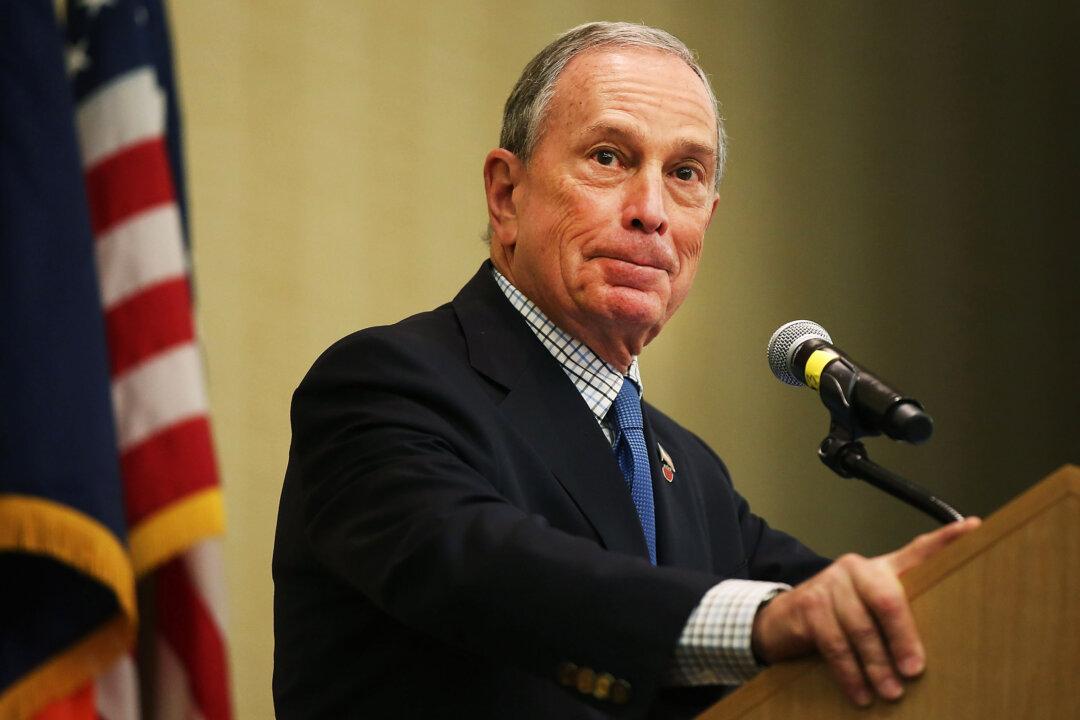NEW YORK—As the mayor of New York City for 12 years, Michael Bloomberg used hard data to drive policymaking, especially when it came to New Yorkers’ health.
He went after smoking, obesity, and chronic lifestyle diseases, which kill more New Yorkers and Americans than infectious illnesses. His calculating approach often drew criticism and lawsuits. Some blamed him for creating a “nanny state.”
But as Bloomberg makes his final rounds in the city, glimpses from public speeches, press conferences, and interviews with former staff members show a man deeply concerned with the people behind the numbers.
“When it came to implementing policies to protect health, the mayor always asked one simple question ‘Will it save lives?’ And if the answer was ‘Yes,’ he was always willing to go to the mat to make it happen,” said Tom Frieden, director of the Centers of Disease Control and Prevention, who served as Bloomberg’s health commissioner from 2002 to 2009.
“He sees the faces and the lives behind the numbers, and because of his leadership New York, the United States, and the world are much healthier and safer,” Frieden said.
Coming into office as a billionaire businessman who made his fortune selling data to Wall Street, Bloomberg was accustomed to using hard, cold research to drive decisions, and it was an approach he used effectively on matters of public health.
The mayor pushed to ban smoking in indoor public spaces and prohibit cigarette sales to anyone under 21. He got artificial trans-fat banned from restaurant food—an action that led fast-food giants like McDonald’s and Dunkin’ Donuts to change their recipes rather than lose access to the New York market.
He got restaurant chains to start posting calorie counts on their menus, lobbied food processors to add less salt to their products, and got city schools to start serving healthier meals. The city distributed millions of free condoms, emblazoned with an “NYC” logo, in an attempt to cut down on teen pregnancy and HIV transmission. One of his pet initiatives essentially created a new public transportation system built around bicycles.
Bloomberg also put new data collection and analytical tools in place to track all the new policies.
The number of lives saved was often the first figure mentioned in agency reports. The number of smoking-related deaths decreased by 1,521 per year in 2009 compared to 2002.
Meanwhile life expectancy has increased in the city by three years since Bloomberg took office, compared to 1.8 years in the rest of the country—a statistic Bloomberg recently noted as one of the most telling of the success of his administration’s various efforts.
Meanwhile, the adult smoking rate has declined from 21.5 percent in 2002 to 15.5 percent today. Childhood obesity rates inched down among schoolchildren.
“He loves to study graphs and charts, ask tough questions, and challenge assumptions. When he’s done that, if he’s satisfied that an idea will help New Yorkers live longer, healthier lives, his support of that idea, regardless of controversy, is unshakeable,” said Thomas Farley, the commissioner of the city’s Department of Health.
A Health Mayor
Bloomberg launched his career as a health policymaker almost immediately on taking office in 2002.
At the time, the municipal cigarette tax was 8 cents a pack. Bloomberg got it increased to $1.50, saying he wanted to make cigarettes so expensive people would be forced to quit. Subsequent increases in the state tax have since raised the per-pack tax to $5.85 within city limits.
Then he went after smoking in public places. New York wasn’t the first place to ban smoking in bars and restaurants. California had done it in 1998. But the cultural impact of New York’s ban seemed to resonate further.
“The question before us is straightforward,” Bloomberg told City Council members at a 2002 hearing. “Does your desire to smoke anywhere at any time trump the right of others to breathe clean air in the workplace?”
As recently as last month, the mayor was still punching away, signing a new law that raised the legal purchase age for cigarettes and set a minimum price of $10.50 per pack. He pushed for, but ultimately abandoned, rules that would have prohibited merchants from even displaying cigarettes for sale. They would have had to hide them in cabinets or under the counter.
The Nation and Beyond
Along the way, Bloomberg influenced national policy. The Affordable Care Act contained a provision, modeled after the one in New York, that will require chain restaurants nationwide to post calorie counts on their menus. The Food and Drug Administration said last month that it was adopting its own trans-fat ban, and would phase the substance out of the food supply for good.
“The effect has certainly been to start a national conversation, which I think is one of the most important roles that New York City has ended up playing,” said Jennifer Pomeranz, director of Legal Initiatives at Yale University’s Rudd Center for Food Policy and Obesity.
And Bloomberg plans to keep the health initiatives going.
One of the world’s richest people and most active philanthropists, Bloomberg has already begun pouring his private fortune into public health projects, including a $600 million anti-smoking campaign ongoing in countries including China, India, and Russia and a $125 million project aimed at reducing road fatalities in 10 nations.
Bloomberg Philanthropies has an obesity prevention program in Mexico, a reproductive health program in Tanzania, and environmental programs aimed at reducing global reliance on polluting coal.
Several of the mayor’s top officials are also joining his new consulting organization, called Bloomberg Associates, that will advise other cities around the world on how to implement smart urban policy, including his health care initiatives.
The Associated Press contributed to this report. Epoch Times staff members Zachary Stieber and Sarah Matheson contributed to this report.





